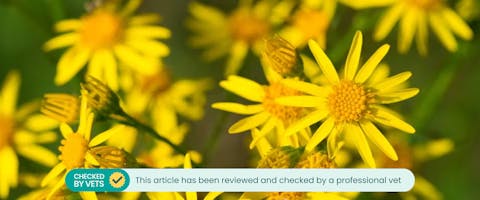Updated 29/09/2023
Ragwort is a widely spread wildflower that’s often found in warm, dry and open spaces in northern Eurasia. With wildflower popularity on the rise due to not only their beautiful colors and shapes, but also their ability to attract bees, you might be wondering - is ragwort poisonous to dogs? Common on verges, wildflower fields and back gardens, your pooch is pretty likely to encounter the flower if you live in the right areas. So without any further ado, let’s find out if ragwort and dogs are a good mix or not…
Trending posts
Purr-use some of the top blogs our members have been loving this month- Top male dog names for your new furry friendGot a new furry family member in your pack? Check…

- Top female dog names for your new fluffy palWelcoming a new pooch into your family? Explore…

- 120+ gray cat names your silver feline will loveRecently welcomed a fluffy gray bundle of joy into…

- What are normal pet sitting rates?Discover the average pet sitting rates for animals…

- Unique dog names to stand out from the packDare to be different with our list of the best…

Is ragwort poisonous to dogs?
Sadly yes, ragwort is very poisonous to dogs, so if you think your pup’s curiosity got the better of them and they have eaten some of the plant, you should contact your vet immediately. All parts of the ragwort plant are considered toxic. The ragwort plant contains pyrrolizidine alkaloids, which are toxic compounds that cause liver failure in dogs. While reactions vary from pup to pup, some of the symptoms caused by the plant can be incredibly serious, and in some cases, can even result in death. Below, we’ll explore some of the symptoms in more detail so that you know what to look out for.
Ragwort poisoning in dogs
So, now we know that ragwort and dogs aren’t exactly a match made in doggy heaven, let’s take a closer look at the symptoms of ragwort poisoning. Before we get into it though, it’s worth noting that if you think your pooch has taken so much as a nibble from a ragwort plant, you should make sure you contact your veterinarian straight away - the plant is incredibly poisonous, and ingestion of even the smallest amount should be treated as an emergency.
Symptoms
- Vomiting
- Diarrhea
- Weakness
- Weight loss
- Anorexia
- Lethargy
- Depression
- Excessive yawning
- Lack of coordination
- Aimless walking
- Head pressing
- Yellow discoloration of the mucous membranes or eyes
- Death
The severity of these symptoms will depend on your pup’s breed, age, and general health, and how much ragwort they have eaten. Thankfully the plant is not very tasty, so dogs only tend to eat it when there is nothing else available.
Symptoms may arise straight away in some dogs, whereas in others, they may take days to show. So, even if you have had a health check with the vet it’s important to keep a close eye on your pup in the following days and to contact your vet immediately if you notice any more symptoms cropping up.
Diagnosis
During your appointment, try to remember any new areas you’ve visited and whether wildflowers were growing there - this is especially important if you didn’t see your pooch eating the ragwort, but they are experiencing symptoms..Your vet will give your pooch a full health check, and look for signs of dehydration or liver disease. They may then take a blood test so they can start to get an idea of what’s going on internally. And if internal damage is suspected, your pup may need to have furhter testing such as an ultrasound of thier belly, particularly focusing on the liver as this is the organ most affected by ragwort toxicity.
Treatment
The methods of treatment your vet chooses will depend on a number of factors, including the severity of your pup’s symptoms, how long ago the ragwort was ingested, and whether you witnessed your dog eating the ragwort first hand. If your dog has eaten ragwort in the last few hours, your vet may choose to induce vomiting in your pup to get as much of the toxin out of their system as quickly as possible and administer activated charcoal to soak up any remaining toxins from your pup’s stomach. This may also be accompanied by fluid therapy to flush out the toxin as quickly as possible while rehydrating your pup at the same time. if your dog is suffering from anorexia resulting in severe weight loss, medication to halt the nausea and stimulate hunger may be given.
Serious cases of ragwort poisoning will need many days of vet care, including intravenous fluids, and medications to help support the liver. Sadly in serious cases, the toxicity can not always be reversed and some dogs will pass away from this toxin. This is why it is vital to contact your vet as soon as you suspect they have eaten ragwort, or are showing any of the signs mentioned above.
Meet our veterinary expert, Corinne
This article has been checked by veterinarian Corinne Wigfall BVMBVS(Hons) BVMedSci(Hons). Corinne is originally from Wales and moved to New Zealand after graduating university. She started her career with a university based equine internship and moved onto mixed and small animal practice. Currently she splits her time between online tele triage and working in an after hours vet clinic.
Other plants that dogs should avoid
Unfortunately, many of the plants around us are harmful to our furry friends if ingested, so get in the know on the plants poisonous to dogs, starting with those below.

